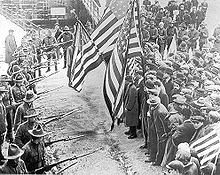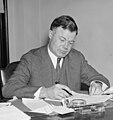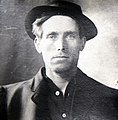Portal:Organized Labour

Introduction

- In trade unions, workers campaign for higher wages, better working conditions and fair treatment from their employers, and through the implementation of labour laws, from their governments. They do this through collective bargaining, sectoral bargaining, and when needed, strike action. In some countries, co-determination gives representatives of workers seats on the board of directors of their employers.
- Political parties representing the interests of workers campaign for labour rights, social security and the welfare state. They are usually called a labour party (in English-speaking countries), a social democratic party (in Germanic countries), a socialist party (in Romance countries), or sometimes a workers' party.
- Though historically less prominent, the cooperative movement campaigns to replace capitalist ownership of the economy with worker cooperatives, consumer cooperatives, and other types of cooperative ownership. This is related to the concept of economic democracy.
The labour movement developed as a response to capitalism and the Industrial Revolution of the late 18th and early 19th centuries, at about the same time as socialism. The early goals of the movement were the right to unionise, the right to vote, democracy and the 40-hour week. As these were achieved in many of the advanced economies of western Europe and north America in the early decades of the 20th century, the labour movement expanded to issues of welfare and social insurance, wealth distribution and income distribution, public services like health care and education, social housing and common ownership. (Full article...)
Selected article
The Lawrence Textile Strike, also known as the Bread and Roses Strike, was a strike of immigrant workers in Lawrence, Massachusetts, in 1912 led by the Industrial Workers of the World (IWW). Prompted by a two-hour pay cut corresponding to a new law shortening the workweek for women, the strike spread rapidly through the town, growing to more than twenty thousand workers and involving nearly every mill in Lawrence. On January 1, 1912, the Massachusetts government enforced a law that cut mill workers' hours in a single work week from 56 hours, to 54 hours. Ten days later, they found out that pay had been reduced along with the cut in hours.
The strike united workers from more than 51 different nationalities many of whom knew little to no English. A large portion of the striking workers, including many of the leaders of the strike, were Italian immigrants. Carried on throughout a brutally cold winter, the strike lasted more than two months, from January to March, defying the assumptions of conservative trade unions within the American Federation of Labor (AFL) that immigrant, largely female and ethnically divided workers could not be organized. In late January, when a striker, Anna LoPizzo, was killed by police during a protest, IWW organizers Joseph Ettor and Arturo Giovannitti were framed and arrested on charges of being accessories to the murder. IWW leaders Bill Haywood and Elizabeth Gurley Flynn came to Lawrence to run the strike. Together they masterminded its signature move, sending hundreds of the strikers' hungry children to sympathetic families in New York, New Jersey, and Vermont. The move drew widespread sympathy, especially after police stopped a further exodus, leading to violence at the Lawrence train station. Congressional hearings followed, resulting in exposure of shocking conditions in the Lawrence mills and calls for investigation of the "wool trust." Mill owners soon decided to settle the strike, giving workers in Lawrence and throughout New England raises of up to 20 percent. Within a year, however, the IWW had largely collapsed in Lawrence.
The Lawrence strike is often referred to as the "Bread and Roses" strike. It has also been called the "strike for three loaves". The phrase "bread and roses" actually preceded the strike, appearing in a poem by James Oppenheim published in The American Magazine in December 1911. A 1915 labor anthology, The Cry for Justice: An Anthology of the Literature of Social Protest by Upton Sinclair, attributed the phrase to the Lawrence strike, and the association stuck. A popular rallying cry from the poem was interwoven with the memory of the strike: "Hearts starve as well as bodies; give us bread, but give us roses!" (Full article...)April in Labor History
Significant dates in labour history.
- April 01 - Burston Strike School began in 1914 the U.K.; the 1972 Major League Baseball strike began in the U.S. and Canada; the 1980 New York City transit strike began; the U.S. Supreme Court decided NLRB v. Truck Drivers Local 449; the Federation of Unions of South Africa was founded; the Allied Pilots Association was founded; the Loray Mill strike began in the U.S. in 1929; Sol Chick Chaikin died
- April 02 - Weldon Mathis was born; Eugene Hanley was born; the 1994–95 Major League Baseball strike ended in 1995
- April 03 - Percy Wells died
- April 04 - The On-to-Ottawa Trek began in Canada in 1935; William Quesse was born; the 2006 Minor League Baseball umpire strike began in the U.S.
- April 06 - Rose Schneiderman was born; the 1905 Chicago Teamsters' strike began as the Teamsters engaged in a sympathy strike; B. T. Ranadive died
- April 07 - The U.S. Supreme Court decided Lochner v. New York; Basawon Singh (Sinha) died
- April 08 - The 1998 Australian waterfront dispute began
- April 09 - John H. Dent died; the U.S. Supreme Court decided Adkins v. Children's Hospital and Bunting v. Oregon; Chris Watson was born; President Harry S. Truman nationalizes all steel mills in anticipation of the 1952 steel strike; Natascha Engel was born; Thomas Jackson was born
- April 10 - Harold J. Gibbons was born; Dolores Huerta was born; Joseph Diescho was born; George Lippard was born; Edward J. Carlough was born; Lee Batchelor was born; Anna Walentynowicz died
- April 11 - The 1980 New York City transit strike ended
- April 12 - Tom Addison was born; the U.S. Supreme Court decided NLRB v. Jones & Laughlin Steel Corp.; the Auto-Lite strike began in 1934 in the U.S.; the Union Label Department, AFL–CIO was founded; the Memphis sanitation strike ended; the Queensland Council of Unions was founded; the Sons of Vulcan was founded
- April 13 - Henk Sneevliet died; the Laborers' International Union of North America was founded
- April 14 - Dorothy Jacobs Bellanca was born; Marvin Miller was born; Ernest Bevin died
- April 15 - A. Philip Randolph was born; Pablo Manlapit died; the American Federation of Teachers was founded; "Black Friday" occurred in 1921 in the U.K.; Aleksei Gastev died; the Trade Unions Forum was founded; Margaretta Scott was born
- April 16 - Joseph Havelock Wilson died
- April 17 - Manwel Dimech died
- April 18 - Joseph Labadie was born; R. J. Thomas died
- April 20 - Gro Harlem Brundtland was born; The Ludlow Massacre occurred in 1914 in the U.S.; the International Harvester strike of 1979–80 ended
- April 21 - The Bituminous coal miners' strike of 1894 began in the U.S.; the First Employment Contract is repealed in France in 2006
- April 22 - Frederick Nicholas Zihlman died
- April 23 - Russell Crowell was born; the Canadian Labour Congress was formed; Cesar Chavez died; the Hock Lee bus riots occurred in 1955 in Singapore; Edward Lamb was born
- April 25 - Arnold Miller was born
- April 26 - United Trade Union Centre (Lanin Sarani) was founded
- April 28 - Workers' Memorial Day; Roy Lee Williams died; Bob White was born; Greg Combet was born; Jerry Horan died; Joseph Glimco died
- April 29 - The Coeur d'Alene miners' dispute of 1899 occurred in the U.S.
More Did you know (auto-generated)
- ... that Marco van Basten's strike in the UEFA Euro 1988 Final was described as "perhaps the most iconic goal in UEFA European Championship history"?
- ... that Sting wrote "We Work the Black Seam" because he felt that "the case for coal was never put to the nation" during the 1984–85 British miners' strike, which began 40 years ago today?
- ... that during the 1913 El Paso smelters' strike the Industrial Workers of the World and the Western Federation of Miners competed to organize the strikers with their respective labor unions?
- ... that a number of bus drivers who participated in a strike were unaware that it was illegally held?
- ... that during the Venezuelan general strike of 2002–2003, all but one of Venezuelan chocolatier María Fernanda Di Giacobbe's ten businesses went bankrupt?
- ... that "The Strike" (1954), about an American officer's turmoil in ordering an air strike on his own men, was rated as Rod Serling's best script he had written to date?
Related Portals
Selected image
Selected Quote
The hospital strikers have demonstrated that you don't get a job done unless you show the Man you're not afraid...If you're not willing to pay that price, then you don't deserve the rewards or benefits that go along with it."
|
— Malcolm X. |
Did you know
- ...that even though the 1952 steel strike lasted 53 days and cost the U.S. $4 billion in lost economic output, it was settled on nearly the same terms offered by the union at the strike's beginning?
- ...that the short-lived Industrial Syndicalist Education League was both the first and the largest syndicalist organisation ever in the United Kingdom?
- ...that Canada's syndicalist One Big Union kept itself alive for some time by running an illegal lottery in its weekly bulletin?
Topics
Get involved
Associated Wikimedia
The following Wikimedia Foundation sister projects provide more on this subject:
-
Commons
Free media repository -
Wikibooks
Free textbooks and manuals -
Wikidata
Free knowledge base -
Wikinews
Free-content news -
Wikiquote
Collection of quotations -
Wikisource
Free-content library -
Wikiversity
Free learning tools -
Wiktionary
Dictionary and thesaurus

















































































